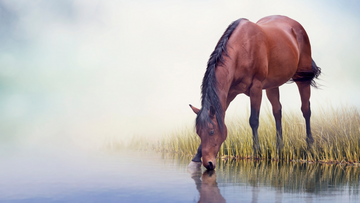Horses are large mammals that require a lot of water to survive. A horse’s body is made up of almost 70% water. Horses lose water through sweat, urination, and other bodily functions. A horse should consume 0.5 gallons of water per 100 pounds of body weight daily. Horses can also gain water from feed. Hay and grass contain 10-15% water. However, grains have almost no water.

If you do not provide enough water for your horse, dehydration can occur. Dehydration can cause colic, intestinal issues, decreased energy, and even death. You must take special care of your horse by providing clean, fresh water. Additionally, you must know that your horse’s needs will change in warmer weather or after activity. Horses need regular watering and cannot go long without water.
Factors to Consider When Calculating Water Needs
Age and Size
Generally speaking, young horses need more water than adult horses who are no longer growing. Young, growing horses require 1 gallon of water per 100 pounds of body weight. On the other hand, adult horses only need 0.5 gallons of water per 100 pounds of body.
Diet and Feeding Habits
Horses who graze in a pasture need less water than those fed a supplemented diet. Grass and leaves carry water for the horse to consume. Moreover, hay contains approximately 15% water. However, hay and grain are relatively dry and can even contain a lot of salt. You will need to adjust your horse’s water supply accordingly.
Weather and Climate
Horses living in hot and humid climates will need more water to replace what they lose from their environment. Additionally, horses living in particularly cold climates also require more water. Drinking water can help them maintain their body temperature in the cold winter Months.
Activity Level and Workload
Horses who perform strenuous activities or have a high workload need more water. Additionally, pregnant and lactating horses require more water.
Signs of Dehydration in Horses
Dehydration is a serious health concern that can lead to severe health complications and even death. While proper hydration can avoid this issue, all owners and riders must know the signs of dehydration in horses. The signs to look for are:
- Dark Urine
- Dry mucous membranes
- Sunken eyes
- Loss of skin elasticity
- Lethargy
Hydration Management Strategies
Routine Water Supply Monitoring
All horse owners should monitor their horse’s water intake to ensure they are properly hydrated. You should always give your horse access to clean water. Monitor how much water is consumed by your horse.
Training for Regular Water Intake
Horse owners can train their horses to drink regularly. This is an important skill, particularly in hot climates. Horses are creatures of habit and are easily trained to take regular drinking breaks.
If your horse is not drinking, you can encourage it to do so with flavorings. Additionally, you can offer warm water during the cold months. Finally, a salt block encourages your horse to drink more.






















